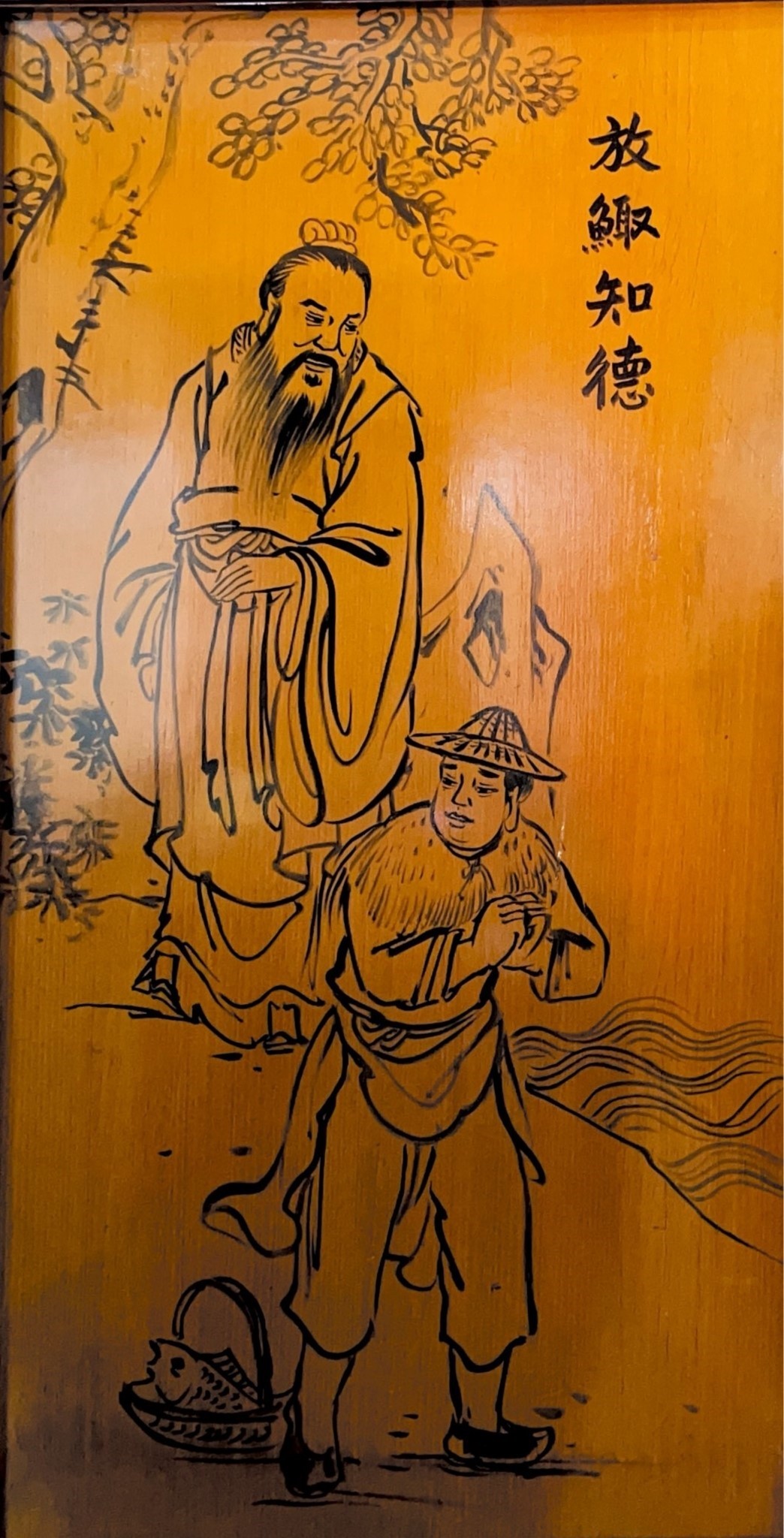by 歐修梅

The story comes from Confucius’ Family Sayings: Explanation of Modesty
One of Confucius’ disciples, Mi Zijian, held office in the State of Lu, presiding over Danfu. After three years, Confucius dispatched Wu Maqi to assess Mi’s administration.
Removing his usual garments at night for a weathered fur coat, Wu Maqi entered the precincts of Danfu.
There, he witnessed a fisherman who, under the cover of night, released every fish he had caught. Intrigued, Wu Maqi inquired, “Most fishermen retain the fish they capture. What compels you to set them free?”
The fisherman replied, “The larger fish, known as ‘chou,’ are cherished by our magistrate. The smaller ones, named ‘sheng,’ are intended by our magistrate to grow. Hence, I release both kinds whenever I catch them.”
Upon his return, Wu Maqi reported to Confucius, “The virtue of Mi Zijian is so widespread that his subjects act as though under stringent laws, even in secrecy. How has he achieved such influence?”
Confucius responded, “I once said to him, ‘Sincerity in one place manifests as if it were strict law in another.’ Mi Zijian has practiced this principle in Danfu.”
Confucius had a student named Mi Zijian, who served as an official managing the town of Danfu in the State of Lu. Mi Zijian governed with an honest mind, practicing benevolence with sincerity and loyalty, which deeply inspired townspeople. After three years, Confucius sent another disciple, Wu Maqi, to Danfu to learn about Mi Zijian’s achievements in governance.
Wu Maqi took off his official attire and, in secret, changed to a tattered leather coat before entering the land of Danfu. There, he saw a man fishing at night, who released the fish he had just caught. Wu Maqi was curious and asked, “Most people keep the fish they catch. Why did you release it at all?” The fisherman explained, “In a group of fish, the larger ones are called ‘chou,’ which means pregnant abalone, while the smaller ones are called ‘sheng.’ Our magistrate Mi Zijian is highly protective of wildlife and cherishes them. He wants us to catch only fully grown fish. The fish I caught fall into both categories, so I released them.”
After he returned, Wu Maqi reported everything he had seen to Confucius and said, “Mi Zijian’s virtuous governance is so effective that people feel they are under strict surveillance even when acting in secret. My master, how could he achieve this?”
Confucius replied, “I once told Zijian, ‘Uttermost sincerity demonstrated in one place will serve as the most exemplary model in another.’ I believe Zijian applied this principle in his governance in Danfu!”
This painting depicts the story of Wu Maqi observing a fisherman catching fish in Danfu. Confucius once said, “The superior’s virtue is like the wind, and the inferior’s virtue is like grass. Wherever the wind blows, the grass bends.” The saying refers to the superior’s virtue as the wind and the inferior’s virtue as the grass in a field. When the wind blows across the grass, the grass moves in the direction of the wind. Wherever the wind blows, the grass bends in that direction. Therefore, Confucius taught Mi Zijian to treat people with sincerity. When Mi Zijian practiced benevolence with sincerity in places that can be monitored by all, in places that no one can see, such as waterfront at night, people will carry out exemplary deeds, such as protecting wildlife and respecting the laws of nature.
